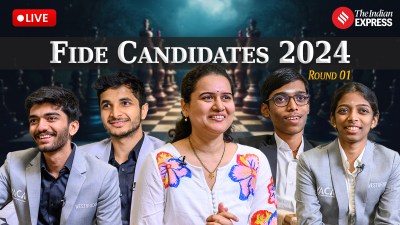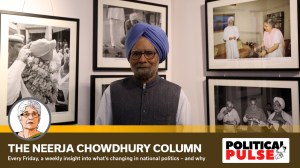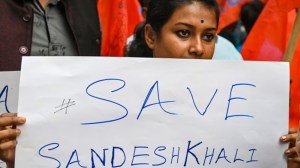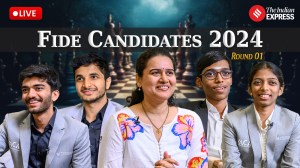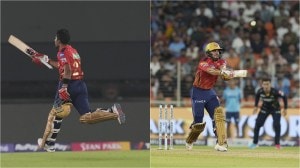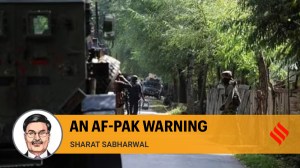- India
- International
Kejriwal in custody, Congress without money: BJP government’s attack on Opposition shows how little it thinks of the voter
A powerful BJP, with a popular prime minister, need not fear electoral loss. So why is it arresting opposition leaders and freezing their accounts ahead of the elections? Only one explanation makes sense.
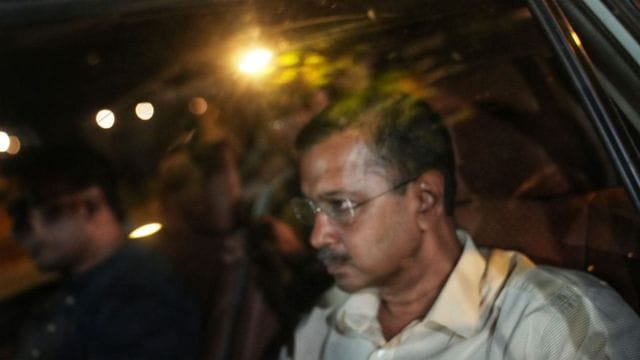 Arvind Kejriwal entering ED Office. (Express photo by Abhinav Saha)
Arvind Kejriwal entering ED Office. (Express photo by Abhinav Saha)First, the facts.
1. At the time of writing, Bharat Rashtra Samithi leader K Kavitha, former Delhi Deputy Chief Minister Manish Sisodia and Chief Minister Arvind Kejriwal are imprisoned or in custody after the Enforcement Directorate (ED) charged them under the Delhi liquor “scam”. Former Jharkhand Chief Minister Hemant Soren is also imprisoned under charges of corruption.
2. The accounts of the Congress party have been frozen ahead of the election. In essence, this means, as Rahul Gandhi put it, that the largest Opposition party can barely campaign.
3. The period between 2014 and 2022 saw a four-fold increase in the number of cases against politicians by the ED and CBI. Over 95 per cent of these are against Opposition leaders. These figures are likely higher and even more skewed now. Under the UPA government in the corresponding period, the figure stood at 54 per cent (14 Opposition leaders out of a total of 26 cases).
4. Cases against some politicians — who were once criticised by top figures of the central government — seem to either go slow or disappear altogether once they join the BJP “washing machine”: Chhagan Bhujbal, Ajit Pawar and Ashok Chavan from Maharashtra; Suvendu Adhikari (West Bengal); C M Ramesh (Andhra Pradesh), among many, many others.

With Arvind Kejriwal’s arrest, India has crossed another Rubicon under BJP rule, and achieved something that no other central government could in “sattar saal” (70 years). Not even during the Emergency was a sitting chief minister placed under arrest.
A question of law vs politics?
There are, broadly, two ways to view the arrests of politicians ahead of a general election but also more generally.
The ED, CBI and even the Income Tax Department are professional enforcement organisations. Strictly speaking, they do not report to political masters — or, at least, they are not supposed to. With trained staff, oaths of office and fidelity to the Constitution, their independent functioning is essential for the statement “let the law take its course” to have any meaning.
It is possible, of course, that it is only the Opposition that partakes in corruption, quid pro quo (electoral bond revelations can be wilfully ignored, perhaps) and criminal activity. That leaders once accused of corruption and terrorism (there’s a sitting MP in Madhya Pradesh who bears that honour) are now paragons of virtue. It is possible, indeed, that the enforcement agencies are not selective and always get their man.
It is possible. But given the facts (see 2,3 above) it is improbable. And to genuinely believe that the “system” is delivering justice is to be naive at best, a liar at worst or perhaps delusional at its most tragic.
The second perspective is far more likely, not least because it is simpler and fits the facts. The ruling party has power. It is using that power to cripple its opponents — the stick of criminal proceedings if you don’t play ball, the carrot of certain accommodations if you do. Ahead of the elections, it is stacking the deck. And by doing so, it reveals how little it thinks of the voter.
Why does a dominant BJP need to be oppressive?
There is little doubt that the BJP is the central pole of Indian politics today — no force has been as all-pervasive, politically and ideologically, since Jawaharlal Nehru and Indira Gandhi at the Centre and the CPI(M)’s 37-year rule in West Bengal. With the BJP’s electoral wins under the leadership of Narendra Modi far outstripping its losses, there is little doubt of the Prime Minister’s popularity. Add to this the vast asymmetry in resources between the ruling party and its opponents and the fact that the INDIA group is not exactly a picture of political unity and ideological clarity, the government has little political reason to upset the applecart: The PM’s perceived popularity and the Sangh Parivaar’s hegemony make it the odds-on favourite in the upcoming elections.
Why, then, so close to the elections, has the ED arrested a popular leader? Why have the Congress’s accounts been frozen?
Some of those opposed to the current regime seem to think this is a sign of insecurity, that the famed BJP electoral machine’s feedback indicates that its prospects in the upcoming polls are dire. The evisceration of the Opposition — through arrests, financial crippling and the threat of cases — is a way to rig the game.
The other explanation is more straightforward. The government and ruling party believe that their hegemony is complete and that they can, with ease and impunity, take care of the opposition.
Labhartis, not citizens
Both explanations – and more importantly, the actions themselves – betray a cynical, disrespectful view of the voter. In this imagination, as she casts her ballot, the fact that the Opposition is destroyed, that elected leaders are jailed, that Parliament is a rubber stamp holds no meaning. She will not care about what the electoral bonds data indicates. She will not care if the election is free — but unfair.
The citizen, in this imagination, is a subject who is the recipient of the government’s largesse — a labharthi. He is not a thinking, rational, moral person. When the choices of democracy are removed, he will quietly look at the gas subsidy credited into his Aadhaar-linked account through Direct Benefit Transfer and rejoice at the ballot box.
This conception of the voter and the citizen is bereft of constitutional and democratic morality. Some would say even the basic decency required of the political class.
Unfortunately, it may be right.
aakash.joshi@expressindia.com
EXPRESS OPINION
More Explained
Apr 04: Latest News
- 01
- 02
- 03
- 04
- 05



